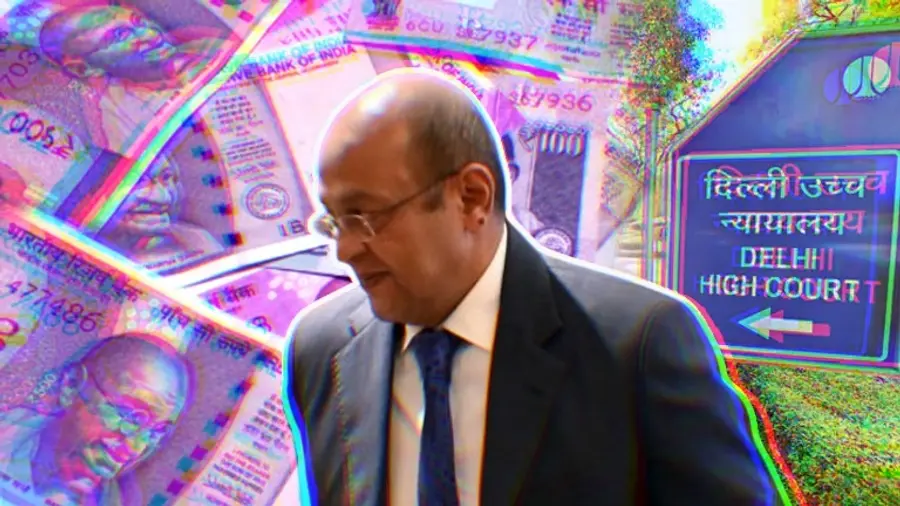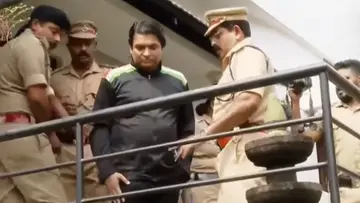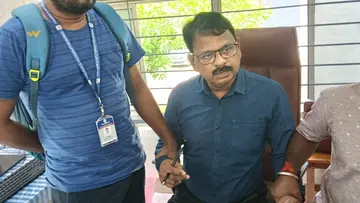Economy
Exposing the Corruption Nexus: Untraceable Tax Defaulters and a Judiciary in Crisis

Anusha Paul
Published on Mar 28, 2025, 09:29 PM | 6 min read
In a move that has shocked legal circles across the country, Justice Yashwant Varma has been swiftly transferred from the Delhi High Court to the Allahabad High Court. This decision, announced today on March 28, 2025, comes just weeks after the explosive incident on March 14, 2025, where burnt currency was discovered at his official residence. While the government insists that this transfer is part of the usual course of judicial reshuffling, it raises questions whether this is an attempt to bury a scandal that could expose the deep corruption within India’s judicial system.
The fire at Justice Varma’s residence was not merely a property accident—it exposed a deeper rot within India’s highest institutions. Hidden in a storeroom at his official quarters were bundles of charred currency notes. Initially denied by security personnel, the existence of the burnt cash was eventually confirmed, leaving a series of uncomfortable questions. Why was such a large sum of cash stored in a judge’s residence? Was this connected to pending high-profile cases? Why has the Delhi Police failed to register an FIR under Section 326(f) IPC for arson, despite the clear signs of foul play? Most troubling of all, critical CCTV footage from the relevant period is mysteriously unavailable.
Justice Varma, who has maintained that he is the victim of a conspiracy, has seen the judicial system move quickly to distance him from Delhi's legal corridors. Whether he is a victim or a willing participant, the reality is that this incident has done irreparable harm to the public’s trust in an institution that is supposed to be above reproach.
While the judiciary is grappling with one scandal after another, the country’s tax system is also teetering on the brink of collapse. On March 25, 2025, the government made a shocking revelation in the Rajya Sabha. It was disclosed that 47,674 direct tax defaulters had been declared untraceable, with a staggering Rs 5.91 lakh crore (Rs 5.91 trillion) missing from the public coffers. Many of these defaulters are large corporations and politically connected individuals, whose wealth appears to have evaporated without a trace.
Despite the existence of sophisticated tracking mechanisms, including the Financial Intelligence Unit (FIU-IND) and asset databases, recovery efforts have failed. It seems clear that India operates with two justice systems: one for the elite, who can make billions disappear without consequence, and another for ordinary citizens who face relentless harassment by tax authorities. While the powerful vanish with massive sums, the common man is left to bear the burden of a corrupt system.
The rot within India’s judicial and tax systems extends far beyond individual scandals; it is a systemic issue. As of December 31, 2024, a staggering Rs 17.59 lakh crore (Rs 17.59 trillion) is locked in legal limbo, tied up in pending cases across the judiciary. These cases involve disputes over both direct and indirect taxes, and they highlight a deeply flawed system that enables the rich and powerful to avoid paying their dues.
The data reveals the true scale of the problem. In direct taxes, Rs 11.83 lakh crore (Rs 11.83 trillion) is stuck in litigation, with over 71,000 cases pending across the Supreme Court, High Courts, and tax tribunals. Of this amount, Rs 4.9 lakh crore (Rs 4.9 trillion) is tied up in cases before the High Courts, while Rs 6.7 lakh crore (Rs 6.7 trillion) remains in dispute in tribunals. For indirect taxes, Rs 5.76 lakh crore (Rs 5.76 trillion) is locked in 82,000 pending cases, with the Customs, Excise, and Service Tax Appellate Tribunal (CESTAT) alone handling over 55,000 cases worth Rs 2.03 lakh crore (Rs 2.03 trillion).
This vast backlog is not the result of incompetence or inefficiency; it is the product of a deliberate strategy designed to protect the wealthy. Cases drag on for decades, allowing tax defaulters to retain their stolen wealth while the judiciary, including figures like Justice Varma, is moved out of the way when things get too hot. The legal system works not for justice, but for those who have the power to delay, obstruct, and evade responsibility.
In 2016, the Bharatiya Janata Party (BJP) led National Democratic Alliance (NDA) government introduced demonetization as a ‘bold’ move to tackle black money and corruption. The narrative promised that this drastic measure would eliminate fake currency and bring the corrupt to justice. However, in practice, demonetization did little more than wreak havoc on the lives of millions of ordinary citizens. Small businesses and industries were left in ruins, while ordinary citizens found themselves stranded in endless queues at banks, desperately trying to access their hard-earned savings. Even now, the scars of the demonetisation crisis remain, and many have yet to recover from its devastating impact. Meanwhile, the country’s elite found ways to launder their black money, aided by political patronage and institutional loopholes.
The latest revelation that Rs 5.91 lakh crore (Rs 5.9 trillion) in tax dues remain untraceable is a stark reminder that demonetization was not a battle against corruption—it was a strategy to enable it. While ordinary citizens bore the brunt of the pain, the wealth of the elite was further entrenched, with the government’s own mechanisms failing to trace massive amounts of lost revenue. Demonetization did not punish the corrupt; it created a perfect opportunity for them to further hide and launder their wealth.
"The transfer of Justice Varma may have been designed to sweep the scandal under the rug, but the truth cannot be buried so easily. It is imperative that citizens demand full transparency and accountability from the government and the judiciary. We must insist on an independent investigation into the burnt money scandal and a complete overhaul of the judicial system to ensure that justice is no longer a commodity for the rich and powerful," says A K Padmanabhan, Vice President, Centre of Indian Trade Unions (CITU).
He further added that, "the names of all untraceable tax defaulters must be made public, and the Rs 17.59 lakh crore (Rs 17.59 trillion) locked in legal battles must be resolved quickly. India stands at a crossroads. The country cannot continue to allow the systematic looting of public resources by the elite. The transfer of one judge cannot be allowed to bury the truth about the billions of rupees that have been stolen from the people. The time for accountability is now, before corruption consumes us all."









0 comments